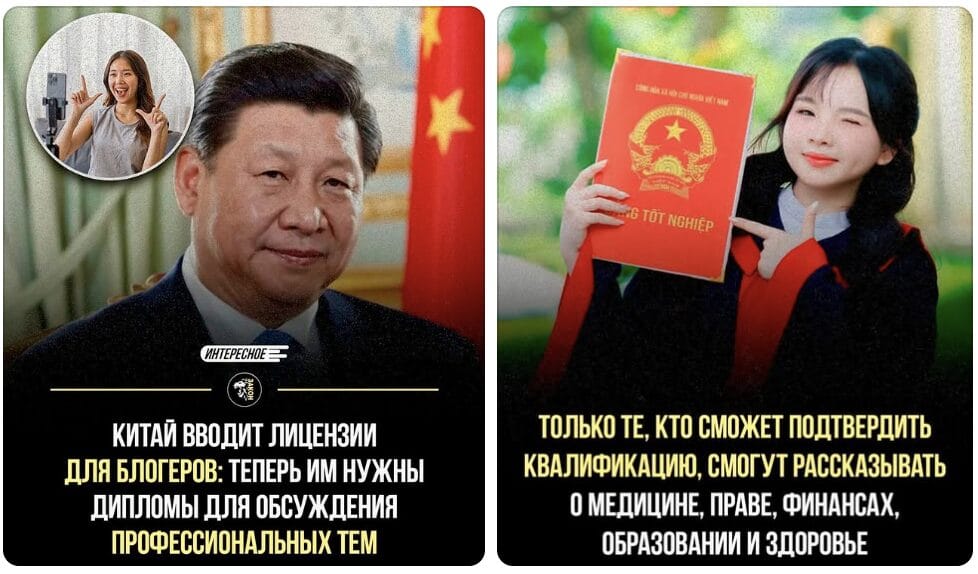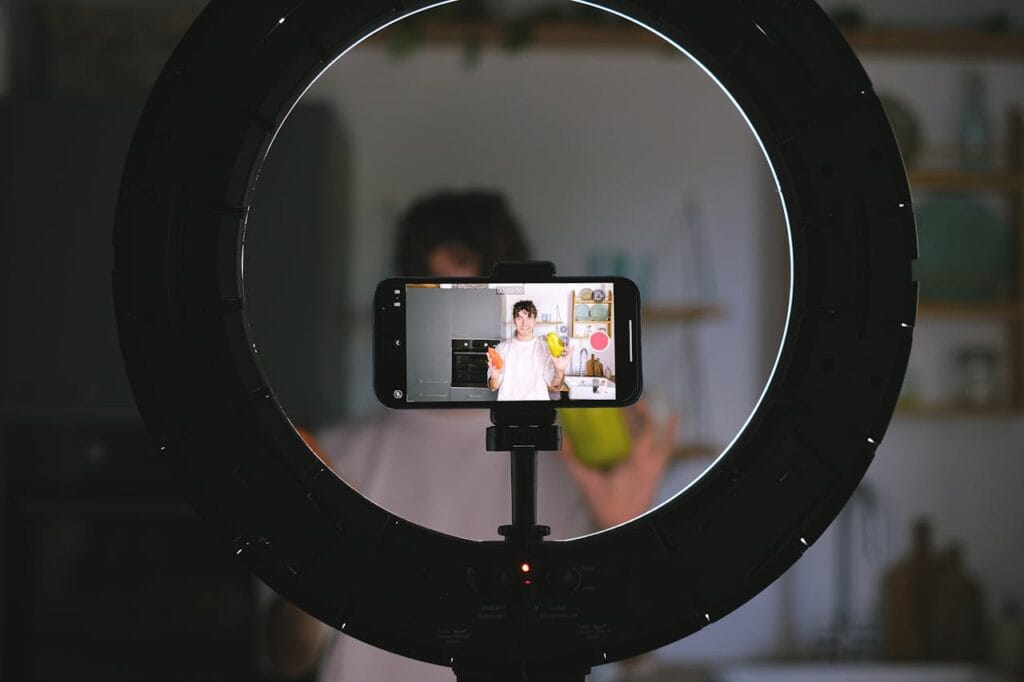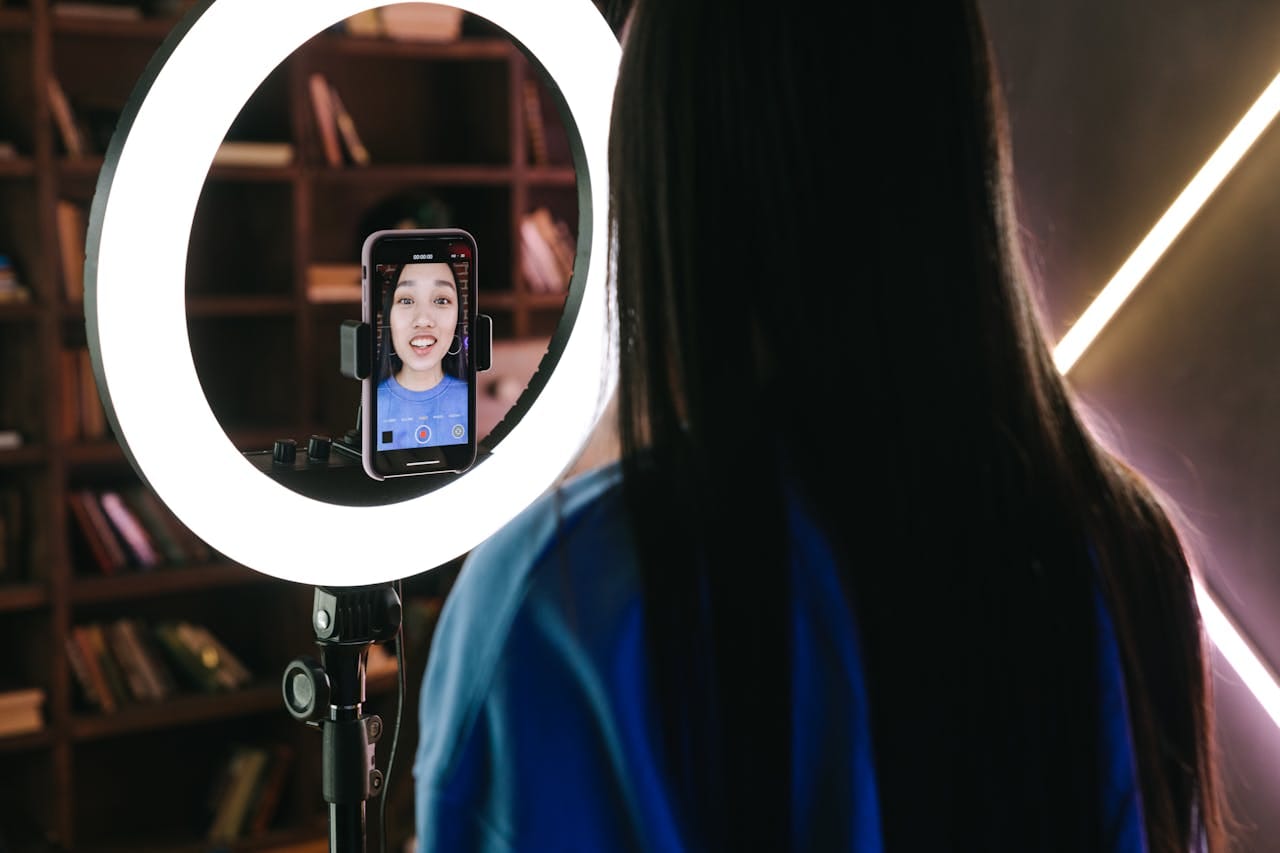In October 2025, information circulated online that the PRC had tightened control over influencers. Now, in order to publish content on the topic of medicine, law, finance and education, they supposedly must have a corresponding diploma. We decided to check the authenticity of this news.
They wrote about innovations for Chinese influencers “Vedomosti", "Kommersant", "Russian newspaper", "Snob"and other media, social network users (Facebook, Instagram, X, Threads, Telegram) and blogging platforms (“Habr", LiveJournal). Some publications specify that local social networks, such as Douyin (the Chinese equivalent of TikTok) and Weibo, will monitor compliance with the new rules. Violators allegedly face account blocking and a fine of up to ¥100,000 (although it is not entirely clear who should pay it - the blogger or the site that did not follow him).

The authors of most Russian-language publications on this topic refer to note publication Morocco World News, and its author, in turn, to the Cyberspace Administration of China (CAC). However, the article does not contain a link to a specific press release on the department’s website, nor the full name of the relevant law, which allegedly came into force on October 25. "Verified" did not find his text on website CAC and other official sources. It is noteworthy that the new law is mainly covered by foreign media, while Chinese publications (with rare exceptions) do not write about it.
The Chinese authorities actively regulate the actions of bloggers, but the current legislation in the country differs from that described in viral publications. In 2020, CAC released Position on managing the ecosystem of online information content. This 42-article set of rules outlines what content Chinese internet users can and cannot produce. However, nothing is said there about confirmation of qualifications, which is required to publish posts on a particular topic. In 2022, the State Radio and Television Administration and the Ministry of Culture and Tourism of the People's Republic of China released Code behavior for Internet broadcasters. Article 13 of this code states that bloggers who broadcast live content that requires a high degree of professionalism (for example, in the fields of medicine, finance, law and education) must have appropriate qualifications, and platforms must verify them. However, the document does not specify what sanctions may be applied to the social network and/or users in case of violation. In addition, the Code does not contain an exhaustive list of topics on which you can only speak out if you have specialized education or relevant work experience; only a few examples are listed.
Apparently, this Code was not enough. In August 2025, CAC, together with the National Health Commission and several other departments, issued regulations, which strictly prohibits publishing posts on medical topics on social networks and blogs if the author does not have the appropriate qualifications (diploma, work experience, etc.). Specific fines are also not specified, but control over compliance with these rules is indeed entrusted to the platforms, which, in case of violation, are obliged to remove content, deprive unscrupulous bloggers of subscribers and block accounts.

Additionally, at the end of July 2025, CAC released notification on the launch of a special campaign to “clarify and suppress the spread of false information by independent media” (that is, large bloggers). The document prohibits malicious misleading of readers: for example, you cannot impersonate relatives of famous personalities, participants in high-profile events, as well as professional lawyers, doctors, financial experts, etc. If numerous media publications are based specifically on this notification, then they significantly distort its essence. Users are not prohibited from writing, for example, about finance, without having a specialized diploma, but it is indeed impossible to give investment advice to readers, positioning oneself as a professional financier and not actually being one. This document, like those mentioned above, does not specify what measures will be applied to violators.
The earliest “Verified” publication found about the new law, which supposedly recently came into force, appeared on October 25 on Instagram thebusinessmagnets. “China is tightening rules for influencers. Anyone discussing professional topics such as medicine, finance, law or education must now prove their qualifications,” the user states. This post also contains information about a fine of ¥100,000 yuan (about 1.1 million rubles). Apparently, the blogger freely retold the same Code of Conduct for Internet Broadcasters, released back in 2022, adding information about fines taken from nowhere, and presented it as some kind of news, as if a law on this topic had just appeared.
It is significant that almost all the publications of thebusinessmagnets, which has about 2.5 million subscribers, are designed in a clickbait style with loud headlines. Moreover, some of his other posts are also “late”. For example, on October 26, news appeared on the blog that in Florida legalized payment in gold and silver coins, while the state governor signed The corresponding bill is due at the end of May. October 2 user published sensational news: China has allegedly developed an innovative glue that can be used to heal a broken bone in three minutes without surgery. Such developments are really are underway, however, so far they have only been tested on animals. And the statement about three minutes is a gross exaggeration: the glue only stabilizes the bone fragments, after which they still need to be given time to heal.
Thus, reports that since October 2025, Chinese bloggers, under threat of a large fine, have been prohibited from speaking on certain topics without specialized training, are not confirmed - “Verified” was unable to detect the text of such a law and/or relevant statements by the Chinese authorities. Such restrictions first appeared in China in 2022, but then the wording was extremely vague. Subsequently, various departments issued more specific bans - for example, they deprived bloggers of the ability to unreasonably pose as experts and at the same time give advice to subscribers. However, it was not possible to confirm reports of huge fines for violators. Apparently, in October 2025, bloggers who did not shy away from clickbait, and after them the media, simply passed off somewhat distorted information about long-existing measures as fresh news.
Cover photo: Ivan Samkov
- Is it true that tutoring has been banned in China?
- Is it true that in Japan, by law, the size of products must strictly match their image on the packaging?
- Is it true that Hong Kong law allows a woman to kill her husband who cheated on her?
- Did Thomas Jefferson say, “When injustice becomes law, resistance becomes duty”?
If you find a spelling or grammatical error, please let us know by highlighting the error text and clicking Ctrl+Enter.






